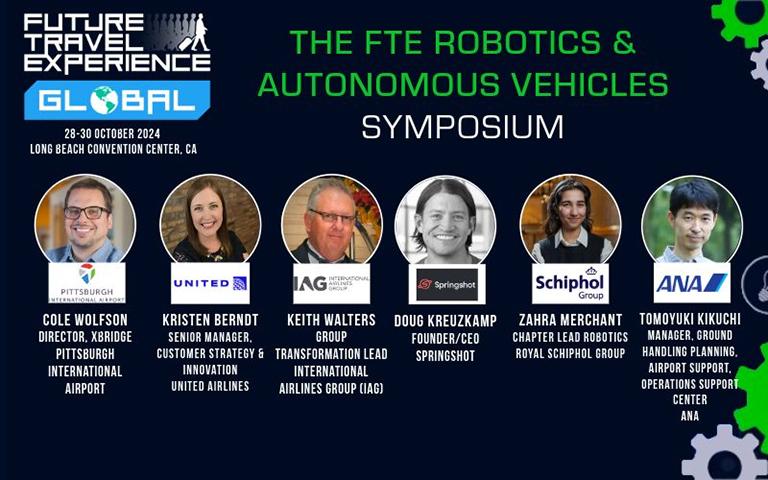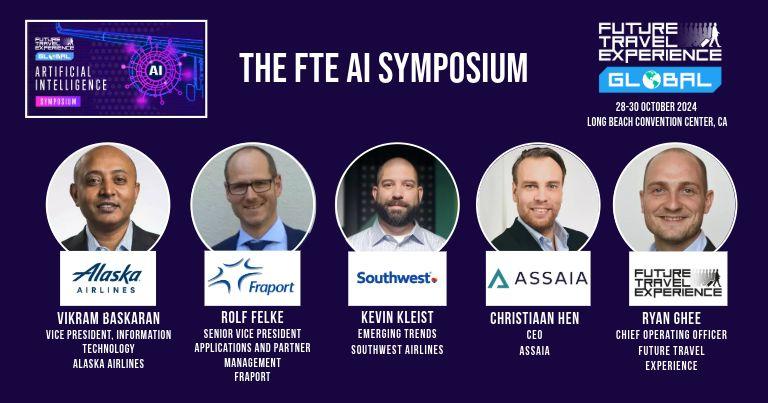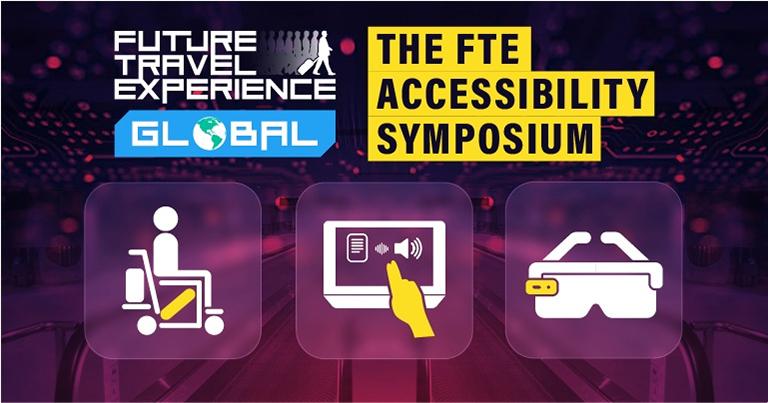FTE Global takes place in Los Angeles on 28-30 October 2024 and will be packed with inspirational content. Key sessions will focus on Robotics & Autonomous Vehicles, Artificial Intelligence, Biometrics & Digital Identity, Private Networks, Accessibility and much more. In this deep-dive article, the likes of Pittsburgh International Airport, United Airlines, Miami International Airport, Alaska Airlines, Fraport, Spirit Airlines, Barich Inc, CVG Airport, Abra Group (parent company of Avianca and GOL Airlines) and more, preview what you can expect to hear at the “CES of Aviation”.
Explore the full FTE Global 2024 schedule at a glance here >> Register for FTE Global 2024 >>The FTE Robotics & Autonomous Vehicles Symposium: focusing on the key issues of human-robot interaction
We are in the middle of a robotics revolution. Robotics technologies and automation can help to solve some of the air transport industry’s biggest challenges, while facilitating more personalised customer experiences and enhancing operational efficiencies.

This session, featuring ‘The FTE Robotics Think Tank Live’ – building on the workshop brainstorming at the 2nd FTE Aviation & Robotics Summit in Pittsburgh this May, will be captained by Cole Wolfson, Director, xBridge, Pittsburgh International Airport (PIT). Pittsburgh is known as the ‘Robotics Capital of the World’ and PIT – a Corporate Partner of the FTE Digital, Innovation & Startup Hub – has done several trials of various autonomous and autonomy-enabling technologies over the past two years. “These trials have been confined to the terminal, parking lots, and other passenger-facing areas, as the challenges of implementation are lessened when these vehicles are not around aircraft,” Wolfson explains. “Now that we’ve refined our processes and formalised partnerships with a few airlines, we’re beginning to move toward testing autonomous technologies on the airfield, prioritising below-wing functions and support.”

The FTE Robotics & Autonomous Vehicles Symposium will also feature Kristen Berndt, Senior Manager, Customer Strategy & Innovation, United Airlines; Keith Walters, Group Transformation Lead, International Airlines Group (IAG); Doug Kreuzkamp, Founder/CEO, Springshot; Zahra Merchant, Chapter Lead Robotics, Royal Schiphol Group; and Tomoyuki Kikuchi, Manager, Ground Handling Planning, Airport Support, Operations Support Center, ANA. “Our panel will be focusing on the key issues of human-robot interaction: focusing on the human centeredness of problem identification and solutions engineering, the necessity of rigorous and ongoing testing of all assumptions and technologies, and the future of work in an evolving, dynamic environment,” says Wolfson.
Meanwhile, Kristen Berndt, Senior Manager, Customer Strategy & Innovation, United Airlines, shares that as we begin to introduce robotics to the airline industry, we will experience a blended workforce with humans and robots working alongside each other. “The expectations of today’s workforce will evolve over time, particularly in the baggage space,” says Berndt. “Responsibilities may shift from a strenuous process of lifting and handling bags to teleoperating, remote-controlling, and monitoring autonomous equipment.”
Learn more in Part 1 and Part 2 of our comprehensive focus on robotics and automation.
Explore the full FTE Global 2024 schedule at a glance here >> Register for FTE Global 2024 >>Biometrics & Digital Identity Summit: delivering next-level CX and efficiencies
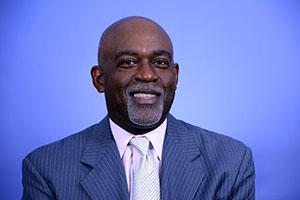
The FTE Biometrics & Digital Identity Summit will explore a range of dynamic approaches and learnings on advancing digital identity to deliver next-level customer experiences and efficiencies. Moderated by Maurice Jenkins, Chief Innovation Officer, Miami International Airport, panellists include William Rumsey, Head of Product – Airport & Customer Ops, British Airways; Lisa Sullivan, Executive Vice President – Travel and Transport, IDEMIA; Jason Fogelman, Senior Director of Airport Innovation, Standards & Training, Spirit Airlines; Kristin Olsen, Director of Product Management, Travel Experience Guest Digital Technology, Alaska Airlines; Chang Ellison, Identity Management Capability Manager, Enrollment, ID Proofing, and Vetting, Transportation Security Administration; and Vladimir Stojkovski, VP of Product Management, CLEAR.
They will share ideas on how the industry can build compelling business cases for significant investment, and for utilising the technology to achieve the vast potential that new digital identity approaches leveraging biometrics can deliver.
“The future of biometrics is bright and has the ability to make a significant impact in the air transport industry,” says Maurice Jenkins, Chief Innovation Officer, Miami International Airport. “While a legislative requirement, leveraging strong collaborative relationships with our stakeholder community can create game opportunities.”
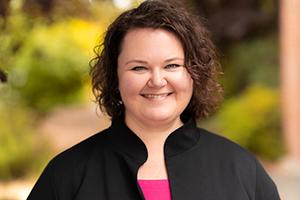
Alaska Airlines is bringing a vision to life where guests can use their digital identity via face or phone at every touchpoint during the day of travel. “We won’t do this alone,” shares Kristin Olsen, Director of Product Management, Travel Experience Guest Digital Technology, Alaska Airlines. “It will take working in partnership across the industry with other airlines, airports, the Transportation Security Administration, U.S. Customs and Border Protection, state governments and technology providers, to make the guest’s use of digital identity a reality.”
Leveraging biometrics is a foundation for improving the customer experience, but also a key to increasing security across airports and ultimately across borders. “At Spirit, 1:1 biometrics combined with self-bag-drop has enabled us to place the travel journey into our guests’ hands at our largest stations, allowing our agents to focus on improved service and unique scenarios requiring special attention,” explains Jason Fogelman, Senior Director of Airport Innovation, Standards & Training, Spirit Airlines. “As an industry, we must work towards a technology standard for airlines to quickly and easily integrate with government data systems to facilitate broad scale and rapid expansion of the U.S. biometric exit program.”
Explore the full FTE Global 2024 schedule at a glance here >> Register for FTE Global 2024 >>The FTE AI Symposium: case studies exploring the best use cases for today, tomorrow and well into the future
Artificial Intelligence (AI) is undoubtedly the biggest industry trend of 2024, with AI integrated into almost every new technology solution. We’re approaching an era of pervasive AI, in which these technologies will further transform the passenger experience, as well as airline and airport operations.
The FTE AI Symposium will feature three compelling case studies exploring the best use cases for today, tomorrow and well into the future. Vikram Baskaran, Vice President, Information Technology, Alaska Airlines, will discuss how Alaska Airlines will use AI to increase productivity, transform customer experiences, streamline operations, remove manual toll and drive revenues, and what it can learn from those efforts.
Kevin Kleist, Head of Emerging Trends, Southwest Airlines, and Christiaan Hen, CEO, Assaia, will deliver a joint presentation titled ‘Southwest Airlines is leveraging computer vision technology to improve turnaround performance at the gate. How successful has this effort been, and how might it further leverage the technology going forward?’

Rolf Felkel, Senior Vice President Applications and Partner Management, Fraport, will highlight what exactly the AI@FRA programme looks like and what business cases and learnings can be shared from the effort so far. “AI makes the difference – especially at airports,” shares Rolf Felkel, Senior Vice President Applications and Partner Management, Fraport. “We address multiple business opportunities in operations and administration of our Airport City FRA and at our subsidiaries worldwide. Doing so we see that Generative AI (GenAI) and Large Language Models (LLMs) are not the one and only approach, but also special AI algorithms and solutions such as computer vision and reinforcement learning can generate a tremendous impact.” Learn more in our deep-dive interview on the AI@Fraport initiative here.
Explore the full FTE Global 2024 schedule at a glance here >> Register for FTE Global 2024 >>FTE Private Networks Symposium: digital transformation starts and grows with robust connectivity
The benefits provided by Private Wireless Networks (PWNs) are increasingly clear, including improved network security and enhanced operational efficiency through superior coverage. Indeed, PWNs are vital for those airports and their partners exploring technologies such as the Internet of Things and autonomous vehicles.
The FTE Private Networks Symposium will be led by Samuel Ingalls, Principal, Barich Inc, and a Captain of the FTE Digital, Innovation & Startup Hub, and Mike Youngs, VP of Information Technology, Dallas-Fort Worth International Airport, with guest speakes including Maurice Jenkins, Chief Innovation Officer, Miami International Airport; Norman Fekrat, Managing Partner, Imagine Wireless, and more.
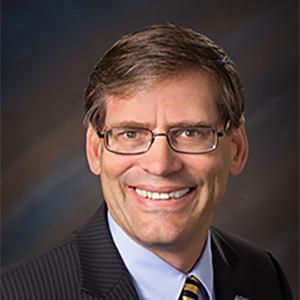
Samuel Ingalls, Principal, Barich Inc, emphasises that airports are large geographic areas, with a need for robust connectivity throughout landside and airside. “This connectivity is a key enabler for both existing systems and sensors, as well as facilitating the wave of newly arriving systems – many utilising the Internet of Things in some form or fashion, such as autonomous systems and vehicles,” Ingalls shares. “All of these systems and sensors are foundational to moving digital transformation from concept to reality.”
Looking ahead to the Private Networks Symposium at FTE Global, Ingalls adds: “I really hope to bring added focus to this important conversation to all of the many stakeholders that would derive benefit. The PWN technology is proven, being something that we all use each and every day – and which works stunningly well. The greater understanding goes to the business benefit – the many use cases that stand to be addressed by the informed application of this technology. In short, connectivity in aviation is no longer a ‘nice-to-have’ – it is an imperative. True and sustained digital transformation starts and grows with that robust connectivity.”
Learn more in our comprehensive focus on Private Wireless Networks here.
Explore the full FTE Global 2024 schedule at a glance here >> Register for FTE Global 2024 >>FTE Accessibility Symposium: making travel more accessible for all
Accessibility is undoubtedly an important topic right now and features in FTE’s ‘12 technology and CX trends that can enhance airline and airport operations in 2024’. The FTE Accessibility Symposium will share progressive accessibility strategies, including tech-focused and experiential solutions to make travel more accessible for all. Moderated by Michael Swiatek, Global Chief Strategy Officer, Abra Group (parent company of Avianca and GOL Airlines), panellists include Hannah Meredith, Senior Manager of Strategic Innovation, Cincinnati/Northern Kentucky International Airport (CVG); Tammy Smith, Director, Customer Experience and Development, Greater Toronto Airports Authority; and Gus Naughton, Senior Software Engineer, Emerging Technologies, Alaska Airlines.

“As the moderator, my mission is to elevate the lives of the world’s largest minority – 1.3 billion people with disabilities – particularly those who are legally blind, like myself, or have low vision,” explains Michael Swiatek, Global Chief Strategy Officer, Abra Group (parent company of Avianca and GOL Airlines). “My focus is on how they can more easily navigate the world of airline travel, both on the ground and in the air.”
Indeed, as not only a senior executive with real-world success in the airline industry but also legally blind himself, Swiatek’s unique life experiences have shaped his outlook and career journey. “Having served as a senior leader in the airline industry while being legally blind, it’s my time to give back,” Swiatek shares. “My goal is to inspire the panel and audience by sharing real-world lessons I’ve learned and combining them with my mission to improve the lives of disabled people. I aim to foster an open discussion around the challenges and opportunities in making air travel more accessible, with a particular emphasis on inclusion and real-world strategies.”

As a key element of its accessibility strategy, CVG Airport – a Corporate Partner of the FTE Digital, Innovation & Startup Hub – strives to ensure that all travellers feel safe and welcome, with the tools they need to travel with ease. “Our approach is evolving to anticipate the needs of our passengers and to ensure that our facility is always ready to welcome them,” explains Hannah Meredith, Senior Manager of Strategic Innovation, CVG Airport. “We are doing this by studying other technology and infrastructure solutions that will provide an equitable journey for all.”
Meredith’s key messages in the FTE Accessibility Symposium will include the importance of advanced solutions for accessibility that are more intuitive than those currently offered at airports, especially relating to translation services. “Furthermore, I would like to stress the importance of designing airport facilities to be adaptable to new technologies that support accessibility,” Meredith shares.
Learn more in our comprehensive focus on accessibility here.
Explore the full FTE Global 2024 schedule at a glance here >> Register for FTE Global 2024 >>